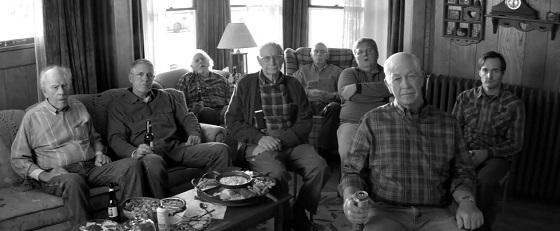Making Things Right
or
And Everything Looks Worse in Black and White
There's a story that Peter Bogdanovich got sick of telling during all the press junkets he did for The Last Picture Show about why he shot in black and white rather than color. Truth was, that he started test-shots of the Archer City location (author Larry McMurtry's home town) in color, but the town always looked too good, and didn't have the sense of bleakness that he wanted. The story goes that he went to Orson Welles (who was staying at his house) and mused maybe he should shoot the movie in black and white. "Of COURSE you'll shoot it in black and white!" Welles barked back. After repeating the story over and over again at press interview after press interview, the last few times Bogdanovich simplified his answer: "Because Orson Welles told me to."
I don't think Alexander Payne shot Nebraska in black and white for that reason, or because it might recall the cover of the same-titled Bruce Springsteen album. But, I think the bleakness is there, running as an under-current through the film as a view of life—not rosy and pink with vitality, green with verdancy, but shades of gray and the occasional extreme of black or white—the palette for a story of folks with limited choices in the nuances of life...and truth. But, lest you think this one's about old folks with one foot in the grave, or Alzheimer's or something like that, it's not. Not really. It's about living life before you run out of it, and grabbing any kind of dignity out of that life, despite Nature's determination to take it away in any way it can.
And not to mention your relatives and acquaintances.
It's also a damned funny movie, in the same low-key, sometimes painful way that its writer, Bob Nelson, wrote sketches for the late, lamented "Almost Live!" show which seemed to focus more on human dysfunction, rather than Pacific Northwest eccentricities. The old saw "familiarity breeds contempt" is apt here, as the extended Gates family, long separated (for good reason, apparently), is blandly caustic, bringing up family histories and past imperfections as grist for the family grinding mill.
The story's simple and seemingly uneventful, but mindful of David Lynch's The Straight Story. Woodrow Gates (Bruce Dern) is picked up by the police walking the highway in Billings, Montana. "Where ya goin'?" says the Sheriff. "Headed down the road there,' says Woody, none too helpfully.
O-kay, there's a little detour to the police station, where his son David (Will Forte) comes to pick him up. "So you told the Sheriff you were walking to Nebraska..." Woody's wife (June Squibb) won't drive him, he doesn't have a car, and he won't be given money for the bus. The reason he wants to go to Nebraska (Lincoln, specifically) is because he got a certificate in the mail from a magazine promotion company saying that he could have won a million dollars. Woody doesn't "buy" that it's a way to get him to buy magazines; he thinks he's won it, so he's walking to Lincoln to get his million. Why didn't he just mail it in? "I'm not going to trust the mail with a million dollars." Makes perfect sense. Walking, though, doesn't.
There's no sympathy at home. Wife Kate won't entertain any of this "I didn't know the son-of-a-bitch wanted to be a millionaire! Know what I'd do with a million dollars? I'd put him in a home!!" Brother Ross (Bob Odenkirk) thinks Dad's senile and doesn't want to hear of it. Only David will entertain the notion of driving Woody to Lincoln, if only for the chance to connect with the old man. They set off with some hitches and fits along the way, eventually stopping at relatives' to get a breather from what would seem to be a continuing series of minor disasters. But, his old stomping grounds bring no comfort, as word soon gets around that Woody's driving to Lincoln to get a million dollars—a sum that strikes everyone dumb...and a little bit stupid. Old debts are brought up, and quite a few people want a part of that million dollars whether they deserve it or not...and for some reason, nobody thinks twice about how Woody might have come into that money—the amount leaves them a little blinkered. And envious. And opportunistic.
For David, it's an opportunity to gain some perspective (just the ability to see Woody's past surroundings adds a little knowledge) and, as he's stuck in a pattern of "getting by," some insight into both Dad and himself. By the time the two ride off into the last shot—one of the loveliest and most potent of the past year's movies, a black-and-white sunset—a nice, warming resolution has been reached. But not too warming. It is a sunset. And it is in black-and-white, lest it betray any cheer or a rosy sensibility. Payne, evidently, did make a color version of Nebraska to satisfy some niche contractual requirements for the studio (Paramount Vantage), but has expressed hope that it never sees the light of electronics.
OF COURSE, it won't. It would be a completely different movie, and a less effective one.







No comments:
Post a Comment